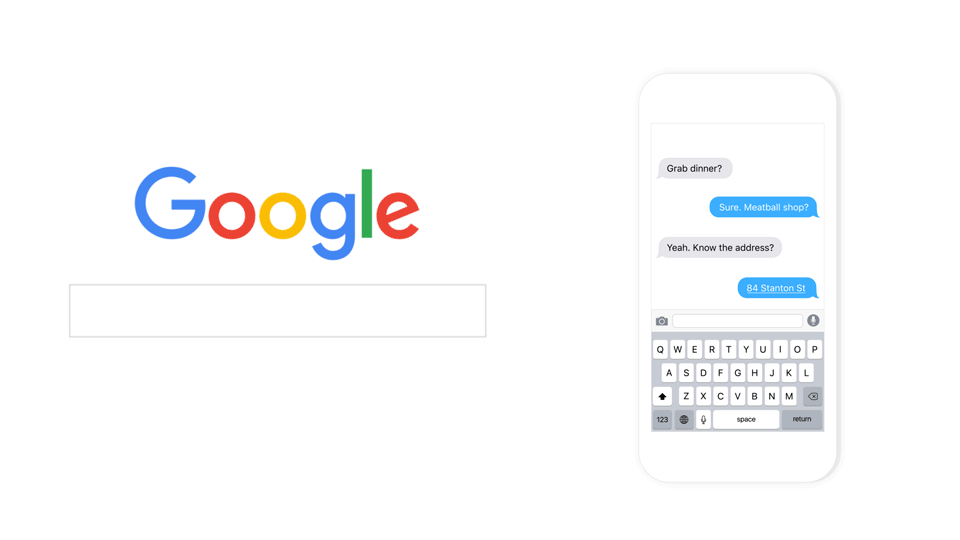Even though Apple opened up iOS to third-party keyboards nearly two years ago, your options have been a little lackluster. Google’s Gboard wants to change that, starting with search.
Gboard, new today, features many of the hallmarks of Google’s (excellent) stock Android keyboard, including the responsive swiping and astute predictions. But other iOS keyboards, like Swype, have offered that since the beginning. What sets Gboard apart is its powerful integrated search feature---something not even Android can boast. At least, not in this convenient a package.
"On Android we've it really easy to get quick access to information for our users. We've built things like Now On Tap, and a quick search bar," says Gboard project lead Rajan Patel. "On iOS, we've found from our own usage that it's a little more difficult to get quick access to information." Specifically, information from Google, which in Gboard is always at the ready.
With the tap of a round Google icon in the upper left corner, you can execute searches without ever leaving your messaging app---whether that's iMessage, email, Slack, Twitter, what have you. Location searches should help make emails less painful, while emoji and GIF searches will power plenty of ill-advised tweets. This is hugely helpful! Currently, if you want to text someone the location of a movie theatre, restaurant, haberdasher, wherever, you need to exit your messaging app, search for the location, copy it, head back to your messaging app, and paste it in. Gboard eliminates all of those steps, except for the searching part. It’s a tremendous time-saver.
The way Google displays results makes Gboard particularly useful. When applicable, Gboard will respond to a search query with a Google Now-style card, which contains the information you need in a tidy little visual capsule; scroll right to see all the card results. To pop a card into your message, just tap it. This copies the link and automatically pastes it into the text field of your messaging app. Search also extends to GIFs and emoji; yes, even a search for “poop” returns not one but two emoji options.
Google’s not just gifting this to iOS as an act of altruism; there are a huge number of iPhone owners who use Apple Maps instead of Google Maps, and the Yelp app instead of Yelp’s mobile site, and so on. That means Google can’t see their activity, and more importantly can’t serve ads against it. By making Google search as convenient as a keyboard tap, it can more easily keep Apple’s 100+ million iOS install base in the Google ecosystem.
Which is mostly fine. It does create a few minor usability issues, though. Often (though not necessarily always) an app experience is preferable to the web, for instance, when Gboard surfaces a Fandango movie time and prompts you to text a link to Fandango's web site, rather than its app. Patel says that this shouldn't be an issue with any app that takes advantage of iOS's deep linking abilities; you can find a list of major apps that do, including Amazon, Pinterest, OpenTable, and more here. And in at least one case, a search for a restaurant returned a URL that was longer than the SMS limit, breaking it up into two parts, and making it unusable.
Gboard also comes with a precaution: When using it to text, the cursor defaults to the text box and not the search box. That could lead to some confusion, or errant messaging of a search term instead of the result.
It's also available only in the US right now, though Patel says his team plans to expand to multiple languages and countries soon.
Until then, US-based iOS users will be happy to finally have a third-party keyboard that's not just feature-filled, but actually fast. To date, almost every other option has been sluggish. Gboard zips, which Patel says isn't due to any kind of privileged access, other than to Google's engineers.
"We think of it first from our own experiences using iOS, and how we often feel like we as users think that bringing information, making it more accessible to us, making it easier to know things, and learn things, and share information, is important," says Patel. "We feel that if we build a good product, something that's useful, that people like, that's great for users and good for Google."
If you’re still stuck on the stock iOS keyboard, you should give one of the alternatives a try. For now, it looks like you won’t do much better than Gboard; it’s responsive, feature-packed, and knows everything about everything. Most important of all, it should save you some time.







